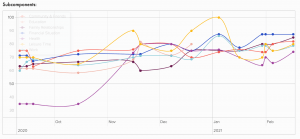Money doesn’t necessarily make you happy but working at the Bank of England deepened Elliot Jones’ (Economics with Integrated Professional Training, 2017) interest in happiness. He’s now founder and editor of Exploring Happiness and has just launched a Happiness Index.
Jones’ (Economics with Integrated Professional Training, 2017) interest in happiness. He’s now founder and editor of Exploring Happiness and has just launched a Happiness Index.
“I think happiness struck such a strong chord with me because it can be applied to almost anything. If we try to explain our actions or decisions, then in almost all cases you end up back at happiness,” Elliot Jones says.
His own interest in happiness economics was sparked by a colleague at the Bank of England when he suggested that Elliot should read Happiness by professor Richard Layard.
“ … as an economist, it makes a lot more sense to me to target happiness as a goal, rather than just aiming to increase wealth. This is a view that is becoming increasingly more mainstream. A number of governments, for example in New Zealand, Iceland, Scotland, and Bhutan, now explicitly target increasing the wellbeing of its citizens.”
According to Elliot, the goal of Exploring Happiness is to increase happiness and wellbeing in society in a sustainable and equal way. This happens through a combination of research and fundraising events.
“Our research focuses on both producing policy recommendations that are consistent with our objectives and finding innovative ways to help boost individuals’ wellbeing,” he says. “Within a given year we look to raise money for charities where we feel that our donations will have the biggest positive impact. This year we are raising money for GiveDirectly. They are a fantastic charity that transfers cash to households in developing countries via mobile phone-linked payment services. They target extremely low-income households and people affected by humanitarian crisis.”
So, what about the Happiness Index, how can that help?
“The purpose of the index was to create a tool that provides support for users’ mental health,“ Elliot explains.
When users create an account, they can personalise the index so it’s as relevant as possible to them. First, users can choose from 13 different individual types, for example, an employed worker, a student, or parent/carer. Second, users can then choose which parts of the index are most important to them.
“The idea here is to capture the fact that everyone is different and what makes each of us happy is also different. Some people are career-driven, others live for the social scene and some are highly family-orientated,” Elliot says. “Despite this, we all also have a lot in common – we all value our health, both mental and physical, the quality of our personal relationships matters a lot, and we all like to have something to do that makes us feel worthwhile. These basic fundamentals are what we use to build our index.”
 On the Happiness Index platform users can see how their happiness score changes over time and create strategies for how to make improvements. The platform, Elliot says, also includes links to articles where users can read about evidence-based ways to support their wellbeing.
On the Happiness Index platform users can see how their happiness score changes over time and create strategies for how to make improvements. The platform, Elliot says, also includes links to articles where users can read about evidence-based ways to support their wellbeing.
“Our view is that by reflecting on how we are doing mentally, making strategies for how to improve, and learning about the evidence, our platform can support our users’ mental health.”
With data protection being a concern for many these days, Elliot wants to stress that all of the data users enter into the systems is kept secure and anonymised in their database, and if you choose to cancel your account, the data is deleted.
Elliot shares his passion for happiness with his partner Jess Golding (Speech and Language Therapy, 2017, and Advanced Practice in Health and Social Care, 2020) who he met at City while they were both studying. She is now Creative Director for Exploring Happiness and involved in the research whenever it touches on neuroscience and mental health, which are areas that cross over with her academic background.
“Jess stayed on at City to complete her master’s degree in Advanced Practice in Health and Social Care. She graduated in the summer of 2020 while also practicing as a Neurorehabilitation Speech and Language Therapist. Over the last 12 months or so she has been one of the NHS heroes, working extremely hard to continue to provide her service in what have been very difficult circumstances,” Elliot says.
Happiness is both a global and personal issue and according to Elliot, their research shows that happiness inequality matters a lot to us right now from a social progress standpoint, only currently trumped by climate change.
“Without happiness as the overarching goal, when considering which policy issues matter most, we would have probably said income/wealth inequality instead. But while developing a fairer distribution of wealth would be a massive step in the right direction, it would only help to solve a part of the problem. Happiness inequality is a much broader umbrella term that captures not only injustices in wealth, but also all of the health and social injustices too,” says Elliot. “Policies that address these issues head-on would make a very big difference to global happiness levels, and these are the types of policies that we focus on.”
And what makes a difference to Elliot Jones’ own happiness levels?
“It certainly helps that I am aware of how lucky I am. I know that as a white male with a middle-class background in one of the richest countries in the world, I almost couldn’t be more privileged. Of course, I try to use this as a means of making a difference, which, perhaps ironically, is good for my own happiness. There’s a lot to say about the selfishness of selflessness. But more broadly, and although it might not sound like it with all the chat about inequalities, I think I stay happy by keeping things light-hearted. My view tends to be to simply separate what we can and can’t control; do the best with what we can control and don’t worry too much about the rest.”
Thank you, Elliot, for sharing your story!